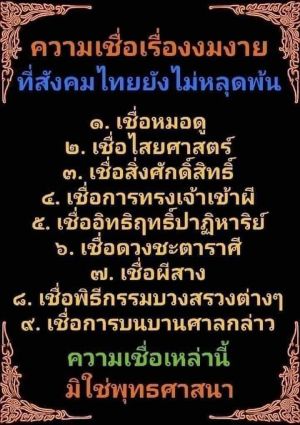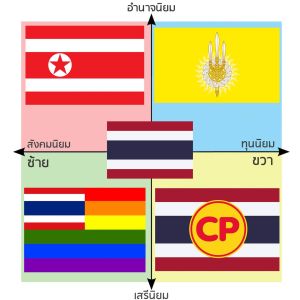Thailand
Thailand: Land of The Free (If you have enough money)
Not to be confused with Republic of Thailand, where the governmental organization unit (อบต.) turns into subdivided states or State of Sarkhan, the federated states of Southeast Asia.
Introduction:
Thailand, also known as the Land of Smiles, is a country that proudly embraces its rich and vibrant culture. With a strong emphasis on Buddhism and a unique blend of tradition and modernity, Thailand is a land of paradoxes and absurdities that will leave you scratching your head in wonder. From the infamous "ศิลธรรมอันดีงาม" (Exquisite Culture) clause to the colorful and sometimes bizarre traditions, Thailand is a country that defies conventional expectations.
The Mysteries of "ศิลธรรมอันดีงาม":
One of Thailand's most amusing absurdities lies in the interpretation of the "ศิลธรรมอันดีงาม" clause. This cultural cornerstone is so broad and open to interpretation that it can be used to justify almost anything. Need an excuse for a raucous water fight during Songkran? You have to dress appropriately when go to the the temple for "ศิลธรรมอันดีงาม!" Want to wear a traditional Thai outfit while eating a Big Mac? We don't care. It's a versatile phrase that allows for all sorts of delightful cultural absurdities.
Temple-Infused Extravaganzas:
Thailand's numerous temples, or "wats," are not just places of worship; they're also a stage for extravagant displays of Thai culture. From the mesmerizing traditional dances performed by elegantly dressed dancers to the larger-than-life Golden UFO that makes the IRS confused by the methods of laundering money, Thai temples are a testament to the country's flair for the dramatic. Just remember, it's all in the name of "ศิลธรรมอันดีงาม!"
Buddhism with a Twist:
Thailand's unique brand of Buddhism adds another layer of absurdity to the cultural landscape. Monks clad in saffron robes happily ride on motorbikes, engrossed in their smartphones while maintaining a serene expression. From amulet-wearing taxi drivers seeking protection from otherworldly forces to the booming business of fortune tellers predicting your future, Buddhism in Thailand takes on a colorful and unconventional form.
The Triumph of Street Food (Food poisoning insurance not included)
Thailand is renowned for its street food culture, where makeshift stalls pop up on every corner. These humble establishments serve up mouthwatering dishes that make your taste buds dance with joy. It's a spectacle of culinary creativity, where chefs whip up delectable treats on sizzling hotplates or in bubbling woks while dodging passing traffic. The chaotic charm of Thailand's street food scene is an absurd delight in itself.
The Land of Contradictions:
Thailand is a country of contradictions. Here, high-rise luxury hotels stand side by side with railroad-side wooden shacks, and sacred temples coexist with Red Light nightlife districts. Traditional customs meld with modern trends, creating a delightful clash of old and new. It's a place where traffic jams are viewed as opportunities for impromptu karaoke sessions and where time seems to be a mere suggestion rather than a strict rule.
Politics
Thailand have held its parliamentary elections this month, reaffirming its reputation as a bastion of pseudo-democracy. While touted as free and fair on paper, the polls simply cemented the rule of the entrenched conservative party.
発展禁止国 (はってんきんしこく) ประเทศห้ามพัฒนา
Critics have derided Thailand as "ประเทศห้ามพัฒนา" or "the country forbidden from progressing" due to its institutional biases that heavily favor the status quo. The most glaring example is the 250 unelected senators appointed by the loyalist elites whose votes are counted alongside the elected lower house to choose the Prime Minister.
This mathematically ensures the conservative cronies always control government no matter what the common electorate desires. The senate is sarcastically called the "fallback insurance" of the ruling party.
Elections have been reduced to symbolic pageantry, with people voting simply because it's a cultural tradition not because they actually expect representation. The mass rallies and youth protests urging democratic reforms are blithely ignored.
Experts say Thailand offers a cautionary tale of democratic backsliding. While elections still take place, the game is structurally rigged to prevent any real change. The needs of the common citizens are neglected as elites focus on maintaining their privileges and political dynasties.

"The Sarkhan model gives democracy a bad name," said one analyst. "It's a facade decorated with the rituals of representative government while Remaining a closed authoritarian system."
Prognosis remains bleak for genuine people power to prevail in Thailand until fundamental reforms take place. For now, elections will continue as empty motions, stymieing hopes for progress. The vested interests holding onto power show no signs of relinquishing their undemocratic advantages anytime soon.
Conclusion:
Thailand, the land of exquisite cultural absurdities, is a place that challenges conventional expectations and embraces the delightful chaos of its traditions. From the whimsical interpretation of "ศิลธรรมอันดีงาม" to the vibrant street food scene and the fascinating blend of Buddhism and modernity, Thailand is a country that revels in its own unique absurdity. So pack your sense of humor and get ready for a journey that will leave you bemused, entertained, and forever enchanted by the wonders of Thailand.
Land of Compromises
As the 10th King said, Thailand is a land of compromises. Let's see what he actually means.
Thailand: The Land of Compromises, Where Everyone Loses (But Smiles About It)
Thailand, affectionately dubbed The Land of Smiles, has always been a nation of contrasts, contradictions, and, most importantly, compromises. Whether it’s a military junta mediating a protest with rubber bullets or a political drama so convoluted it makes soap operas look tame, this country has mastered the art of half-measures that leave no one fully satisfied. And let’s not forget the latest chapter in this saga, starring real estate mogul-turned-Prime Minister Settha Thavisin, a smorgasbord of foreign investors, and a political left-behind that makes the phrase “better luck next time” sound optimistic.
The Settha Compromise: Where Capitalism Meets… Even More Capitalism
When Settha Thavisin took the reins as Prime Minister, expectations were high—or at least as high as they could be in a political system that runs on backroom deals and “family ties”. Settha, founder of Sansiri PLC and certified real estate baron, brought with him a vision: open the gates of Thailand to foreign investors. And by “open the gates,” we mean he essentially handed them a skeleton key.
Under Settha’s administration, foreign ownership laws were relaxed to the point where any oligarch with a briefcase full of cash could buy a slice of Bangkok’s skyline. Who benefited? The Chinese, the Russians, and anyone else who could outbid the locals. Who didn’t? The Thai people who now can't afford a condo unless they sell a kidney—though, ironically, even kidney-selling is on the verge of becoming regulated to accommodate foreign demand.
But hey, who needs housing security when we can boast an economy boosted by high-rise developments that look more like Moscow than Muang Thong Thani? Progress!
And Then Came The Political "Unproductives"
Of course, while Settha was busy deregulating the real estate market, another group was noticeably left out of his grand compromise: political activists. Because, as any self-respecting government will tell you, why waste time appeasing people who don’t contribute to GDP? After all, political activists are just unproductives—they don’t build skyscrapers, buy luxury condos, or bribe officials. All they do is demand things like democracy, freedom of speech, and human rights. What a bore.
From the perspective of the powers that be, the math was simple: activists don’t pay taxes but demand rights. Investors, on the other hand, throw money at your economy while demanding nothing more than a visa loophole and a private beach. Guess who won that battle? Spoiler alert: it wasn’t the kids holding signs in front of Democracy Monument.
The End of the Settha Era: A Shinawatra Revival
But Settha’s compromises turned out to be his undoing. Turns out, selling out your country to foreign buyers while ignoring half the population isn’t a great look. In the end, Settha’s tenure was as short-lived as the hope of affordable housing. The "Holy Spirit" have removed Settha and appointed Paetongtarn Shinawatra, the latest political scion of the Shinawatra dynasty. If Settha was all about pragmatic capitalism, Paetongtarn represents nostalgic nepotism.
As the daughter of Thaksin Shinawatra—Thailand’s former Prime Minister-turned-fugitive-turned-returnee (courtesy of a very suspicious royal pardon)—Paetongtarn’s ascension felt less like a new era and more like “Shinawatra: The Sequel.” With her close ties to both the business elite and the royal family, she’s the perfect embodiment of Thailand’s “compromise” system: everyone gets a piece of the pie, except the people who actually need it.
But Hey, At Least LGBTQ+ Rights Won?
In all this mess, there was one undeniable victory: the LGBTQ+ community finally got their bare minimum of equality. Under the Royal Decree, the government passed legislation changing marriage laws from “man and woman” to the more inclusive “person and person” and will be live in 120 days. It’s a step forward, no doubt, but in the grand scheme of things, it felt like giving someone a Band-Aid while their house is on fire.
The LGBTQ+ community may now be able to marry freely, but good luck finding a home to live in when every condo in Bangkok is owned by someone whose name you can’t even pronounce. Still, progress is progress, right? At least now we can all die equally homeless.
The Compromise We Deserve
Thailand has always been the land of compromises, and the current political landscape is no different. The Move Forward Party’s electoral victory gave way to Pheu Thai’s backroom deals. The people’s cries for democracy were drowned out by investor dollars. And while political activists languish in irrelevance, oligarchs sip champagne from the balconies of their Bangkok penthouses.
But hey, at least we’ve got our smiles, our kinda sorta democracy, and our shiny new skyscrapers. In the end, isn’t that what compromise is all about? Giving everyone something to complain about?
Thailand: The Land of Compromises, where no one wins, but everyone learns to live with it...
Cryptocurrency Regulations: The Thailand's SEC
I can help you understand the news article and comments about Thailand SEC's regulations for Memecoins and the distinction between BRKR and EXCH.
Key Points:
- Thailand SEC's Regulations for Memecoins: Exchanges in Thailand are not allowed to list Memecoins directly, but they can still facilitate trading through "broker execution". This means that traders can place orders for Memecoins through a broker, but the exchange itself cannot list or promote the coins.
- BRKR vs. EXCH: BRKR stands for "broker" and EXCH stands for "exchange." They are two different types of entities that play different roles in the trading process. Brokers connect buyers and sellers and execute trades, while exchanges provide a platform for trading different assets.
- Unfair Advantage of Gulf Binance: Gulf Binance, a white-labeled regional exchange from Binance, has an unfair advantage over its competitors because it has an internal broker connection. This means that Gulf Binance customers can easily trade Memecoins through broker execution, while customers of other exchanges may have to go through a third-party broker.
- Derivatives Trading and Perpetual Futures: Derivatives trading and perpetual futures are still illegal in Thailand. This means that you cannot trade options, futures, or other derivatives on Thai exchanges. Feeling disappointed by your regulators? You can still do it through decentralized or offshore exchanges anyway.
Additional Information:
- MoNoRi-Chan's "Bank of N. I.": MoNoRi-Chan is an educator and Bybit Exchange partner. He operates a P2P broker service called "Bank of N. I." and jokingly said that if you can't buy a frog coin or feel the need to open a position on perpetual futures, Bank of N. I.'s broker has it. However, it is important to remember that derivatives trading and perpetual futures are still illegal in Thailand and I don't fuckin care. SEC manuals are just merely suggestions anyways.
Overall, the Thailand SEC's regulations for Memecoins are designed to protect investors limit their own liability from the risks associated with these volatile and speculative assets. However, the regulations also create an uneven playing field for exchanges, with those that have internal broker connections having an unfair advantage. It is important for traders to be aware of these regulations rigged rules and to only trade with licensed and reputable brokers. Boooriiinng.
Tech Infrastructure
Thailand's 5G Coverage: A Hidden Gem
Thailand is often overlooked when it comes to technological advancements, but the country has quietly become a leader in 5G coverage. In fact, Thailand has one of the most extensive 5G networks in Southeast Asia, with coverage in both urban and rural areas.
This is in stark contrast to many other countries in the region, where 5G coverage is still limited to major cities. For example, in Indonesia, 5G is only available in Jakarta and a few other major cities. In Vietnam, 5G coverage is even more limited, with only a few small areas covered.
Why is Thailand's 5G coverage so good?
There are a few reasons for Thailand's 5G success. First, the government has been very supportive of the rollout of 5G. In 2020, the government auctioned off 5G licenses to three major telecom operators: AIS, DTAC, and True. The government also set a goal of having 5G coverage in all 77 provinces by 2023.
Second, the telecom operators in Thailand have been investing heavily in 5G infrastructure. AIS, DTAC, and True have all committed to spending billions of dollars on 5G over the next few years.
What are the benefits of 5G for Thailand?
5G has the potential to bring a wide range of benefits to Thailand. For example, 5G can be used to improve the speed and reliability of mobile internet connections. This can lead to increased productivity and economic growth.
5G can also be used to develop new applications and services in areas such as healthcare, education, and manufacturing. For example, 5G can be used to connect doctors and patients in remote areas, or to provide real-time training for workers in factories.
Conclusion
Thailand's 5G coverage is a hidden gem that is often overlooked. The country has one of the most extensive 5G networks in Southeast Asia, and this is due to the support of the government and the investment of the telecom operators. 5G has the potential to bring a wide range of benefits to Thailand, including increased productivity, economic growth, and new applications and services.
Additional Information
- In addition to the 5G coverage, Thailand also has a very fast and reliable 4G network. This means that even if you don't have a 5G phone, you can still enjoy high-speed internet access in most parts of the country.
- Thailand is also a leader in digital payments. The country has a very high rate of mobile phone ownership, and many people use their phones to make payments for goods and services. This is due in part to the widespread availability of fast and reliable internet access.
- The widespread availability of fast and reliable internet access has also led to the growth of the e-commerce industry in Thailand. Many people in Thailand now shop online for goods and services.
Overall, Thailand is a leader in digital technology. The country has a fast and reliable internet network, a high rate of mobile phone ownership, and a growing e-commerce industry.



